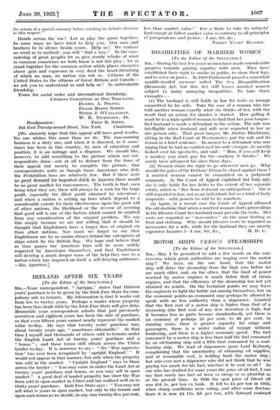DISABILITIES OF MARRIED WOMEN
[To the Editor of the SPECTATOR.] SIR,—During the last few years women have made considerable progress towards gaining equality with men. They have established their right to smoke in public, to show their legs, and to serve on juries. In 1919 Parliament passed a somewhat muddle-headed measure called The Sex Disqualification (Removal) Act, but this Act still leaves married women subject to many annoying inequalities. To take three examples :- (1) The husband is still liable in law for torts or wrongs committed by his wife. Take the case of a woman who has told another woman exactly what she thinks of her, with the result that an action for slander is started. How galling it must be to a high-spirited woman to find that her poor tongue- tied husband is made a defendant in the action. The rule was intelligible when husband and wife were regarded in law as one person only. That great lawyer, Mr. Justice Blackburn, sitting in the Bail Court at Westminster, put the rule and its reason in a brief sentence. In answer to a defendant who was urging that he had no control over his wife's tongue, he merely looked over his spectacles, and said : " Man, if you will keep a monkey you must pay for the crockery it breaks." We surely have advanced far since those days.
(2) Women claim the right to go wherever men go. Why should the gates of the Debtors' Prison be closed against them ? A married woman cannot be committed on a judgment summons. As the Court of Appeal explained not long ago, she is only liable for her debts to the extent of her separate estate, which is " free from restraint on anticipation." She is still regarded in law, not as an individual, but as a kind of body corporate—with powers to add to its numbers.
(3) Again, in a recent case the Court of Appeal affirmed the old doctrine that when a married woman starts proceedings in the Divorce Court her husband must provide the costs. Her costs are regarded as " necessaries " on the same footing as food and clothing. Why should Divorce costs be regarded as necessaries for a wife, while for the husband they are merely expensive luxuries ?—I am, Sir, &c., M. D. C.










































 Previous page
Previous page